Methody fairs well ...
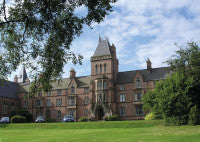
Chris McCullough talks to Head Groundsman Peter Boviard about the methods he employs at Methody
Situated on the south side of Northern Ireland's capital, and on one of the more affluent roads of the city, sits Methodist College Belfast, or Methody as it is more widely known.
Methody is a leading grammar school with around 1,800 pupils from eleven to eighteen years old and a preparatory department for 300 more pupils from four years old to eleven.
The school has an outstanding reputation for not only academic excellence but also for achieving winning performances in music and drama. However, it is on the rugby pitches where it truly excels.
Methody was founded by the Methodist Church in 1865 and is a non-denominational, co-educational grammar school, where pupils of all faiths, and none, are welcomed into a safe, supportive and inclusive environment.
One part of the preparatory department, Fullerton House, is situated in the college grounds on the Malone Road, whilst the other, Downey House, stands in the middle of the extensive college playing fields at Pirrie Park, just a few miles away.
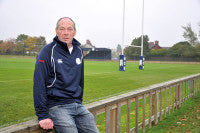
For the past eleven years, Peter has taken great care of the school's playing fields which must look their best at all times.
Peter lives on site in a college house and, together with his team of two staff, tends the pitches and playing surfaces housed on forty-three acres, which is quite a good size for grounds close to the centre of a major city. In fact, years ago, the site used to be a farm and the old farmhouse still exists today.
Peter has enjoyed an illustrious career moving around schools and universities in a quite small catchment area.
Peter said: "I first started my career as a gardener working for a local health trust. After three years, in 1989, I moved to Queen's University Belfast and spent ten years working in the gardening team at the main campus. I was then offered a groundsman post at the university playing fields where I was to spend the next four years."
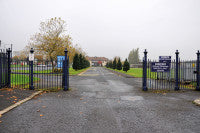
Over the years, Peter has undertaken a series of training courses to keep his skills and education up to date. "I have my City and Guilds in Horticulture and the NEBS Management Certificate," said Peter. "I also hold various turf related training certificates as well as receiving in-house training, including selection interviewing, accident reporting, PA1/PA6, manual handling, working at heights and First Aid."
Inspiring Peter to forge ahead with his career in turfcare was one of his former bosses. "One man who helped me was Gary Mack, who is currently head grounds officer at Massey University in Palmerston North in New Zealand. He was my boss at Queen's University and played a large part in my development as a groundsman."
Peter is proud of the local history of the grounds in which he resides and looks after. "Pirrie Park used to be farmland and the grounds still have the old farm house on site, complete with the original fireplace."
"William James Pirrie was born in Canada in 1847, but his parents were from Conlig in County Down. At the age of fifteen, he was made an apprentice at Harland and Wolff shipyard and later became the Lord Mayor of Belfast. He bought Pirrie Park as farmland for his workers and it was turned into recreation. It was in 1922 that Lord Pirrie gave money to Harland and Wolff for them to purchase the forty-three acres of farmland adjoining the land at Ravenhill Park."
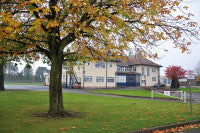
Nowadays, the site remains at the same size and consists of nine grass pitches, two all-weather hockey pitches, ten tennis courts, two synthetic cricket mats, five grass wickets, a netball court and a children's playground. There are also three changing blocks, a preparatory school and car parking on the site.
On another site at Deramore Park, there is a synthetic surface hockey pitch which is also the responsibility of Peter and his team.
Working with Peter on the historic grounds are two full time staff; Terry Allen, who joined last year, and Stewart Casement who only joined the team three months ago.
"Budgets are set by the school's bursar and spending is then agreed between me and the facilities manager," said Peter.
"During the summer, we employ a student for three months to help cover holidays and increased workload. We are self-sufficient for most of all our operations, but we do use a contractor for topdressing."

"As the ground is quite heavy, regular aeration is required. This involves deep verti-draining and the use of a Ground Breaker to keep the ground free draining and playable. A fertilising programme is used to maintain the sward."
The pitches at Methody's playing fields are widely used by the local community and other agencies, including the Ulster Rugby team.
Peter said: "Local junior football clubs use our facilities plus it's also used for pre-season training for seniors. The pitches are also used throughout the summer for training camps."
"Other local schools also use the facilities for sports days, plus Ulster Rugby and their Academy use the facility throughout the year for training."
The Methody playing fields are situated in an open area and, therefore, are free from issues of shading from the sun. "The grounds don't suffer from anything major, just the normal morning frosts and usually a couple of snowfalls throughout the winter months. We always salt the hard surface areas to maintain site safety."
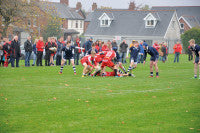
"Aeration processes are carried out with a Sisis slit spiker around once a month. We also use a Charterhouse Verti-Drain every two months as well as a Blec Ground Breaker twice a year. We hire in a scarifier once a year to rid the pitches of any moss. Any weed and pest control is carried out, dependent on budgets, biannually."
"Hard surface areas are usually treated for weeds or moss three times a year. We do our linemarking once a week and any overseeding is done twice a year using a Moore Unidrill seeder."
"Every two or three years our main pitches are hollow cored, whilst the synthetic pitch is brushed twice a week and sprayed once a year for moss and algae."
The fertilising programme sees the team giving two summer applications using Everris 9:7:7 and also a slow release Sierrablen Plus 24:5:13 on the sand based pitches.
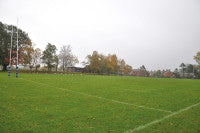
Peter added: "All staff carry out the full range of duties required at the grounds. However, we do play to each member's experience in particular tasks."
"Presentation is very important here at Methody. As people say, first impressions last. It is important that linemarking and pitch aesthetics look their finest."
"Any renovation work to be completed at the grounds is subject to budgetary control. However, I am fortunate to have a stable budget each year, which helps significantly in planning our yearly programmes."
"We only have a small window for renovation work thanks to summer camps and external bodies using the facility for training purposes."
Back in 2013, Peter oversaw a renovation of three small rugby pitches that had no drainage and were very wet, leaving them unplayable for most of the winter period.
This project was entered into by the college, having reached agreement with Ulster Rugby, for the use of the renovated pitches.
In the summer, the surface baked hard, to such an extent, that it was difficult to excavate with a spade. The surface was uneven with undulations impeding surface water run-off.
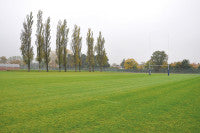
"Work commenced at the end of September 2013 and comprised the construction of a sand carpet area of approximately 21,200 square metres to take the two rugby football pitches and a synthetic cricket pitch."
"We installed a 5,600m piped land drainage system across the area having 100mm bore perforated collector pipes at approximately 4m centres. Plus, we installed, at 900mm centres, 23,350m of 70mm wide by 300mm slit drains orthogonally to the piped drains of the pitches."
"The sand carpet was sown in June 2014 and establishment maintenance completed in August 2015, with the pitches played shortly thereafter."
Peter confirmed that weather is not really a factor when considering renovation work. He also said regular soil samples are not taken to ascertain specific work requirements.
When it comes to the artificial surfaces Peter and his team look after, they follow a regular maintenance plan. "A litter lift and safety check are carried out twice a week. Brushing is done twice a week and weed and moss control applied once per year. This is a new pitch and, in future years, the surface will be deep cleaned as required."
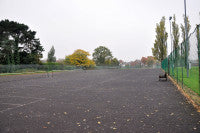
Both Peter and his team receive training on a regular basis to keep up to date. "All staff receive in-house safety training, including manual handling, working at heights and child protection. I have also been trained as a fire warden."
"If a course is relevant to the job, the training is offered to all staff. I'm also a first aider alongside teachers and coaches at the facility."
To aid Peter and his staff with their daily chores, a variety of machinery is available including tractors and implements.
"All items of machinery are bought outright," said Peter. "Second-hand machinery is considered, if it meets all recognised health and safety standards. We always buy the machinery from local dealers. However, we are not necessarily loyal to any one brand or manufacturer. We look at each piece of machinery and choose the one which suits our needs best, irrespective of manufacturer."
"One of the more recent machinery purchases for the college grounds was the Blec Ground Breaker. It has helped significantly on those pitches which are heavy loam or those suffering from compaction due to overuse. In the past, we have hired in a Shockwave machine and operative to relieve deep compaction on a number of pitches."
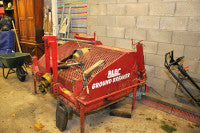
Peter has his own wish list when it comes to new machinery he would like for the grounds. "We are always looking at ways to improve our equipment within the confines of our budget," said Peter. "However, I would like a ride-on triple cylinder mower to enhance our mowing regime. I would also like to replace our older Massey Ferguson tractor. This also would help improve our day to day maintenance."
The Methody playing fields, like many others, succumb to pests and diseases, but Peter and his team try to keep on top of them. "Due to budget restraints, we carry out weed control on the pitches every two years. Like most places, we suffer from red thread, which we treat through our fertiliser programme."
"We are quite lucky here as we don't have many pests like rabbits, badgers, foxes or geese, but we do have a few gulls that like to land here."
The environment and ecology forms an important part of Peter's programme and the team are introducing new methods to increase their floral content. "The environment is very important to us," Peter confirms. We now leave a one metre uncut strip around the whole facility which has created a wildlife corridor."
"We have a number of small wooded areas which are maintained to ensure good undercover growth. Bird boxes and feeders have been placed throughout the grounds. Leaf fall in a number of areas goes unlifted to encourage worm activity."
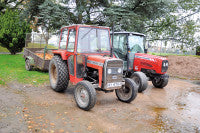
Massey Ferguson 240 tractor
Massey Ferguson 1547 tractor
John Deere X740 ride on mower
Major Deck 6ft
Blec Ground Breaker
Kawasaki TH43 strimmer
Honda HRX 476 pedestrian mower
Hayter Harier 48 pedestrian mower
Ransomes Superbowl 51
ATCO Z4E
Sisis spiker
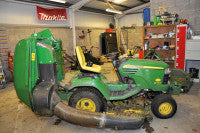
Line marker GMX Bowcom
Vitax TXE 505 linemarker
Stihl BR600 backpack blower
Kawasaki KBR 400B backpack blower
EV-N-Spred walk behind spreader
Hardi 400 litre sprayer
